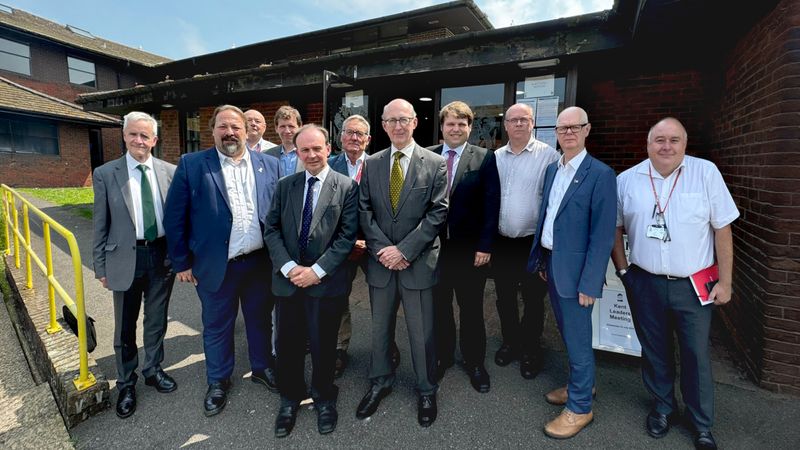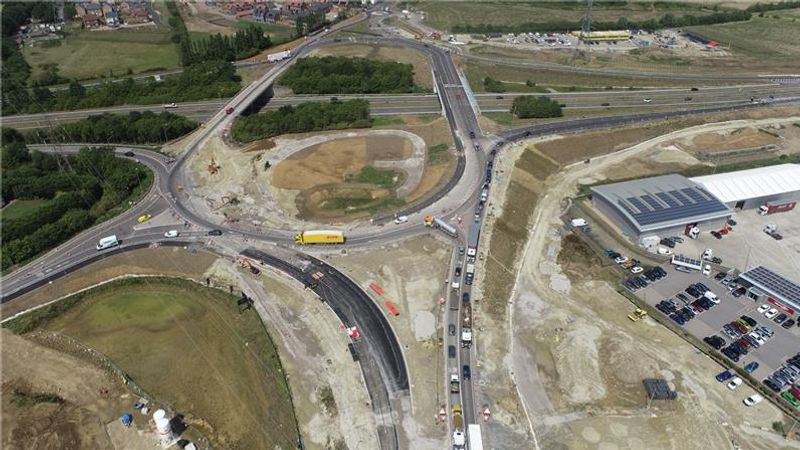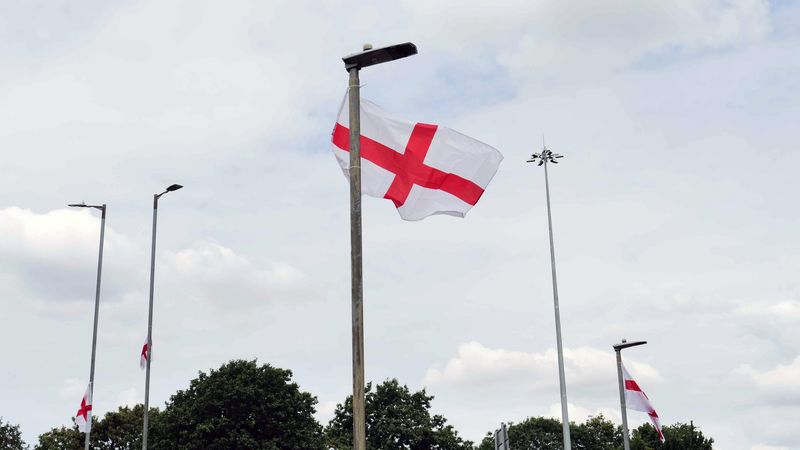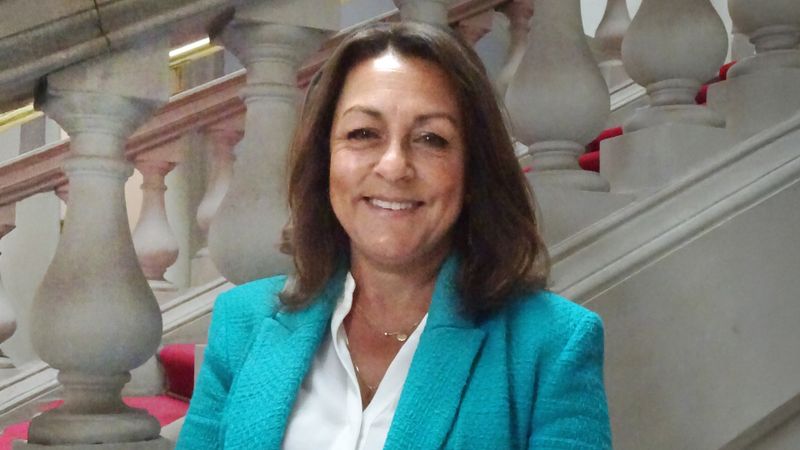Following a meeting in Dover today, a letter will be sent to Yvette Cooper MP, Secretary of State for the Home Department, and Louise Haigh MP, Secretary of State for Transport, collectively asking Government to take urgent action to avoid disruption at the border between the UK and France, which threatens to seriously impact international trade and people travelling through Kent.
The letter, signed by all 14 Council Leaders in the county, reads as follows:
As Leaders of the County Council, Medway Council, and the District and Borough Councils of Kent, we are calling on the new Government to urgently do everything in its power to reduce the risk of disruption across Kent and Medway when EES (Entry Exit System) checks are introduced by the EU later this year.
Kent is the gateway to Europe, and the Short Straits is the most important entry point to the continent for the whole of the UK. The route is therefore critical to the supply chain of this country, as a quarter of all food imported into the UK from the EU passes through the Port of Dover and Eurotunnel. If Kent is gridlocked, supply chains will be fundamentally impacted, and therefore the implementation of EES checks is not just a Kent problem – but a national problem.
Over a long period of time, we have collectively asked Government to support Kent ahead of the implementation of EU EES checks, to avoid disruption at key points on the border between the UK and France. We continue to press for urgent action, given that these checks threaten to result in extremely serious delays for international trade, those travelling through Kent, and will have a knock-on effect on our local communities, residents, businesses, tourism, and the delivery of vital public sector services along the route to Dover.
This is not just about the introduction of EES checks. The continual and disproportionate impact on local communities and ultimately people’s lives across Kent and Medway as a result of what are essentially national and international border issues is unsustainable and requires Government support and recognition to be relieved. For too long our residents, businesses and local authorities in Kent have had to bear the brunt of gridlock on our roads caused by cross channel traffic. Kent is all too often ground to halt and at the mercy of a range of threats, from severe weather in the channel, to industrial action at Calais. Every time the M20 effectively closes, haulage companies lose up to a million pounds a day, local businesses suffer, critically our residents’ everyday lives are severely disrupted meaning they cannot go to the supermarket, get to a GP, drop their children off at school, visit friends and family or have days out and, in extreme situations, the huge cost of welfare delivered to thousands of drivers becomes the responsibility of councils.
Tourism is a vital part of our economy and takes a significant hit every time delays occur. Long term solutions are urgently needed to address this constant threat to Kent. In the summer of 2022, severe congestion on the approaches to both Port of Dover and Eurotunnel caused long delays, with tourists stuck in queues for over 14 hours. Initial data analysis carried out by partners in the Kent and Medway Resilience Forum (KMRF) suggests that the impact of introducing of EES checks on tourist traffic crossing the channel is expected to be much worse and will occur on a regular basis. However, as we are not able to fully access the analysis carried out by the Government, we have no option but to use the data we have to plan for disruption expected as a result of the introduction of EES checks. It is inevitable that periods of severe disruption will continue to occur until new ways to manage traffic bound for the continent are found at a national level. For now, Operation Brock and Dover TAP are the only tools available to the KMRF to manage traffic flow into Dover, which frequently has such a huge impact on Kent’s strategic road network.
We stress that, as much as partners in the KMRF plan and put what measures they can in place to avoid the build-up of traffic, our border is extremely fragile and exposed to numerous factors which severely impact the road network and turn Kent into a lorry park. In preparation for EES checks being implemented later this year, Eurotunnel has created an area within their terminal where dedicated booths will be used to carry out EES checks. The Port of Dover is continuing to develop plans, however there is very limited space in the buffer zone between the Eastern Docks roundabout and the French customs booths. The limited space within the Port of Dover, and the fact that EES checks will take more time to process passengers, means that there could be lengthy delays for all tourist traffic entering the port. Whilst it is understood that the Port is planning more extensive improvements, these are subject to continuing support from Central Government and will not be fully complete for several years. Even if this work is carried out, disruption will continue without further sites to take tourist traffic off the strategic network before it reaches the port. Any queuing tourist traffic outside the Port and back onto the A20, A2 and M20 heading into Dover will also delay freight traffic.
Therefore, significant queuing threatens to become very frequent at the border and back onto the road network in Kent. Further sites to enable tourist traffic to be taken off the road network and processed through EES checks ahead of their arrival at the ports have been identified by KMRF. Timely Government decisions and confirmation about this additional infrastructure are urgently needed, as these sites need to be rapidly developed in order that they can be up and running as soon as possible. Even if a decision is made in the next few weeks, the sites won’t be ready before July 2025. As these sites are not yet operational, and tourist traffic cannot be formally queued on the road network (in the same way freight is queued in Op Brock / Dover TAP), the KMRF can only try and manage tourist traffic wherever it is queuing, along with the existing freight traffic management measures.
The Government must urgently work with the EU to find a technological solution to enable the Port of Dover to process passengers through the port, along with facilitating new sites outside of the port where these checks can be carried out. Due to the lack of space, the only current solution is to use tablets. Initial testing of these has found them to be wholly unreliable. We are extremely concerned that no solution to this problem has yet been found, and that nothing will be in place before the autumn.
The ability of all partners to deliver all of the operational plans on the ground when EES checks come into force will very much rely on sufficient funding and support from Government. Many public service providers find themselves in incredibly challenging financial operating environments and are unable to absorb the cost impact associated with planning, response and the resultant impacts from border disruption. KMRF partners have submitted an indicative funding bid based on our best estimates to date, and we implore you to reassure us all that you will support us in being able to deploy sufficient resources and infrastructure to cope with the anticipated disruption.
Kent taxpayers must not bear the costs associated with a national issue. It is also imperative that to take our planning further we also need to be given clear timelines for the implementation of changes; clarity in relation to any Government mitigations; and a single version of the truth in relation to scenarios and data modelling that can be shared with partners. The ongoing and frustrating absence of access for all KMRF partners to the Government’s Reasonable Worst Case Scenario (RWCS), and the modelling commissioned by Kent County Council but funded by the Department for Transport, now presents a significant risk to our planning.
As Kent Council Leaders we urgently need more clarity from the EU about when it will introduce these new checks. We also need you to support us in finding and funding new long-term, sustainable ways to manage cross channel traffic, and to ensure that Kent has the infrastructure in place to ensure that EES checks do not have a devastating impact on national supply chains, cross-channel tourists and hauliers, and communities and businesses across Kent & Medway.
It is now vital that we fully engage with the new Government on this urgent issue for Kent and the UK. We stand ready to work closely and collaboratively with you and other key stakeholders to ensure the introduction of EES checks is as smooth as it can be.
In summary, Kent Council Leaders’ key asks to Government are:
- Recognise the severe risk of disruption across Kent and Medway when EES checks are introduced as well as impacts on national supply chains, and prioritise across Government Departments the design and implementation of mitigation measures
- Recognise this is a national issue that will disproportionately impact our local communities and services, and consider our indicative funding bid submitted detailing necessary resources and infrastructure to cope with anticipated disruption
- Share with KMRF as a matter of urgency, access to data modelling, timelines and mitigations already in development, and specifically the Government’s Reasonable Worst Case Scenario (RWCS) modelling
- Provide urgent clarity and decision-making on proposed sites to enable tourist traffic to be processed off the road network ahead of their arrival at the ports
- Work with the EU to find a technological solution to enable the Port of Dover to process passengers more quickly through the port as well as off-site
- Longer-term, work with the EU, Government Departments and key local strategic stakeholders to design and implement sustainable ways to manage cross channel traffic throughout the year, whilst investing in the necessary infrastructure to safeguard the resilience of national supply chains and most critically for us, minimise the impacts on our communities and businesses across Kent & Medway
- The letter was signed by; Roger Gough (KCC) Vince Maple (Medway) Kevin Mills (Dover) Noel Ovenden (Ashford) Jim Martin (Folkestone & Hythe) Matt Boughton (Tonbridge & Malling) Tim Gibson (Swale) Roddy Hogarth (Sevenoaks) Ben Chapelard (Tunbridge Wells) Stuart Jeffery (Maidstone) John Burden (Gravesham) Alan Baldock (Canterbury) Jeremy Kite MBE (Dartford) and Rick Everitt (Thanet)




